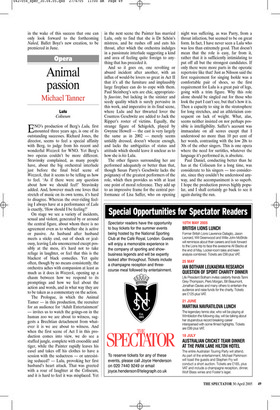Animal passion
Michael Tanner
Lulu Coliseum ENO’s production of Berg’s Lulu, first mounted three years ago, is one of its outstanding successes. Richard Jones, the director, seems to feel a special affinity with Berg, to judge from his recent and wonderful Wozzeck for WNO. Yet Berg’s two operas couldn’t be more different. Stravinsky complained, as many people have, about the big orchestral interlude just before the final brief scene of Wozzeck, that it seems to be telling us how to feel. ‘As if there were any question about how we should feel!’ Stravinsky added. And, however much one loves that stretch of music on its own terms, it’s hard to disagree. Whereas the over-riding feeling I always have at a performance of Lulu is exactly, ‘How should I be feeling?’ On stage we see a variety of incidents, sexual and violent, generated by or around the central figure, about whom there is no agreement even as to whether she is active or passive. As husband after husband meets a sticky end, out of shock or jealousy, leaving Lulu unconcerned except possibly at the mess, it’s hard not to take refuge in laughter, or feel that this is the blackest of black comedies. Yet quite often, though by no means consistently, the orchestra aches with compassion at least as much as it does in Wozzeck, opening up a chasm between how we respond to its promptings and how we feel about the action and words, and in what way they are to be taken as a commentary on the action.
The Prologue, in which the Animal Tamer — in this production, the recruiter for an audience for ‘Adult Entertainment’ — invites us to watch the goings-on in the human zoo we are about to witness, suggests a Brechtian detachment from whatever it is we are about to witness. And when the first scene of Act I in this production comes into view, we do see a stuffed jungle, complete with crocodile and tiger, while the Painter rapidly leaves his easel and takes off his clothes to have a session with the seductress — or unresisting seduced? — Lulu, provoking her first husband’s heart attack. That was greeted with a roar of laughter at the Coliseum, and it is hard to feel it was misplaced. Yet in the next scene the Painter has married Lulu, only to find that she is Dr Schiin’s mistress, and he rushes off and cuts his throat, after which the orchestra indulges in a passionate interlude suggesting a kind and area of feeling quite foreign to anything that has preceded it.
And so it goes on, one revolting or absurd incident after another, with an influx of would-be lovers so great in Act II that it’s all the furniture and implausibly large fireplace can do to cope with them. Paul Steinberg’s sets are chic, appropriately fauviste, but lacking in the sinister and seedy quality which is surely pervasive in this work, and imperative in its final scene, where Lulu and her thwarted lover the Countess Geschwitz are added to Jack the Ripper’s roster of victims. Equally, the strange figure of Schigolch, played by Gwynne Howell — the cast is very largely the same as in 2002 — merely seems untidily dressed, doesn’t wheeze enough, and lacks the ambiguities of status and attitude which should leave it unclear as to how she is his Lulu.
The other figures surrounding her are performed adequately or better than that, though Susan Parry’s Geschwitz lacks the poignancy of the greatest performers of the role, which then provides us with at least one point of moral reference. They add up to an impressive frame for the central performance of Lisa Saffer, who on opening night was suffering, as was Parry, from a throat infection, but seemed to be on great form. In fact, I have never seen a Lulu who was less than extremely good. That doesn’t mean that the role is easy, far from it, rather that it is sufficiently intimidating to put off all but the strongest candidates. If only there were more parts in the operatic repertoire like that! Just as Nilsson said the first requirement for singing Isolde was a comfortable pair of shoes, so the first requirement for Lulu is a great pair of legs, going with a trim figure. Why this role alone should be singled out for those who look the part I can’t see, but that’s how it is. Then a capacity to sing in the stratosphere for long stretches, and an athleticism consequent on lack of weight. What, alas, seems neither insisted on nor perhaps possible is intelligibility. Saffer’s account was immaculate on all scores except that I understood no more than 10 per cent of her words, contrasting with the low 20s to 30s of the other singers. This is one opera where the need for surtitles, whatever the language it’s performed in, is absolute.
Paul Daniel, conducting better than he has at the Coliseum for a long time, was considerate to his singers — too considerate, since they couldn’t be understood anyway, and the accompaniment is so superb. I hope the production proves highly popular, and I shall certainly go back to see it again during the run.




















































 Previous page
Previous page